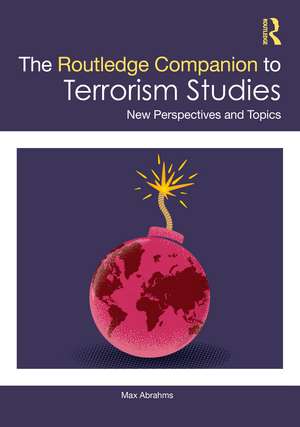The Routledge Companion to Terrorism Studies: New Perspectives and Topics
Autor Max Abrahmsen Limba Engleză Hardback – 5 noi 2024
Providing incisive analysis on timely topics related to terrorism and counterterrorism, this volume will be essential reading for students, scholars, and practitioners in security studies.
Preț: 1486.42 lei
Preț vechi: 1633.43 lei
-9% Nou
Puncte Express: 2230
Preț estimativ în valută:
284.42€ • 297.76$ • 235.34£
284.42€ • 297.76$ • 235.34£
Carte tipărită la comandă
Livrare economică 07-21 aprilie
Preluare comenzi: 021 569.72.76
Specificații
ISBN-13: 9781032454443
ISBN-10: 103245444X
Pagini: 318
Dimensiuni: 174 x 246 x 24 mm
Greutate: 0.75 kg
Ediția:1
Editura: Taylor & Francis
Colecția Routledge
Locul publicării:Oxford, United Kingdom
ISBN-10: 103245444X
Pagini: 318
Dimensiuni: 174 x 246 x 24 mm
Greutate: 0.75 kg
Ediția:1
Editura: Taylor & Francis
Colecția Routledge
Locul publicării:Oxford, United Kingdom
Public țintă
PostgraduateCuprins
Introduction I: RECONCEPTUALIZING TERRORISM 1. Defining Terrorism: Why It Matters 2. Terrorism and Research Design: How to Avoid Common Pitfalls and Learn to Spot Them 3. The Social History of Political Violence 4. State Terrorism: The Elephant in the Room 5. Terrorism and Mass Shootings 6. Terrorism During Civil War II: UNDERSTUDIED TERRORISTS 7. Militant Islamist Extremism in Southeast Asia 8. Terrorism in the Sahel 9. Terrorism in Latin America: A Neglected Region in Terrorism Studies 10. The Ustasha Regime, 1941-1945: An Understudied Case Study in Terrorism Studies 11. Women's Engagement with Political Violence and Terrorism 12. Terrorism’s Gender Dynamics: Women, Men, and Da’esh 13. Far-Right Terrorism: The History, Present, and Future III: TERRORIST INNOVATIONS 14. Terrorist Groups and Unmanned Aerial Vehicles: A Growing Threat 15. New and Emerging Technologies for Terrorists 16. Terrorism and Information Warfare 17. Terrorism and Social Media 18. Cyberterrorism: How Terror Groups Use Cyberspace IV: NEW TOPICS IN TERRORISM STUDIES 19. The Social Ecology of Trauma and Extremist Violence 20. Terrorism and Foreign Interference 21. Terrorism and the United Nations 22. The Great Replacement Theory 23. The Crime-Terror Nexus: A Burgeoning Research Area 24. Vying to Win: Understanding Terrorist Competition 25. Terrorism and Publicity: Is the Conventional Wisdom Changing? V: HOW MUCH HAS TERRORISM REALLY EVOLVED? 26. Is the ‘New’ Terrorism of Today Truly New? 27. The Evolution of Modern Terrorism 28. The Irish Republican Army: Implications for Terrorism Studies 29. Islamist Political Violence: Deconstructing the Threat 30. Black September and Its Enduring Counterterrorism Legacy 31. The Evolution of Hezbollah 32. Palestinian Terrorism: How Is It Different? VI: RESPONSES TO TERRORISM 33. Is Terrorism an Effective Tactic? Evolution in the Conventional Wisdom 33. Terrorism and Overreaction 34. Human Rights and Terrorism 35. Targeted Killing: Weighing the Pros and Cons 36. The War on Terror: The Past and Future Problem
Notă biografică
Max Abrahms is a tenured professor of political science at Northeastern University, where he specializes in international security, especially terrorism. Abrahms has published extensively in leading academic and popular outlets such as International Security, International Organization, Foreign Affairs, New York Times, Washington Post, USA Today, and The Atlantic. He regularly consults for government agencies and provides analysis in the media on the contemporary terrorism landscape. Previously, Abrahms taught at Harvard, Johns Hopkins, and Dartmouth.
Descriere
Although the literature on terrorism is vast, there are many gaps in it. This book helps to fill these lacunae with entries from top terrorism scholars and counterterrorism practitioners in the world.
